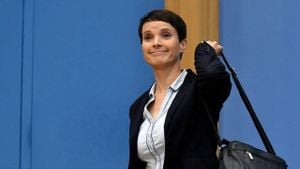Bavarian State Election results have painted a complex political picture, showcasing significant shifts within the local party standings. The Christian Social Union (CSU) emerged as the lead party but fell short of expectations, experiencing gains with 37.8%, reflecting a 6.1 percentage point increase compared to 2021. Meanwhile, the Alternative for Germany (AFD) saw its support surge to 18.9%, nearly doubling its previous share, marking this election as one of dramatic change and heartfelt reactions.
Despite the positive numbers, CSU Chief Markus Söder acknowledged the need for caution, asserting, "It’s clear who the number one is" and emphasized the demand for strong leadership. Commenting on coalition possibilities, Söder reiterated his firm stance against cooperating with the Greens, noting, “The rest ampoule is voted out; the CDU and CSU now have the mandate to form a government.” His sentiments were echoed by Alexander Dobrindt, the CSU spokesperson, who proclaimed, “We carry disproportionately again to the overall result of the Union.”
On the contrary, AFD leader Stephan Protschka celebrated his party's gains, stating, "The protest voters of today will be the core voters of tomorrow." Their messaging, particularly focused around governance and migration, deeply resonates with Bavarian constituents who feel overlooked by traditional parties. Protschka's comments came during the AFD’s election watch party, where supporters were elated about their prospects.
The Social Democratic Party (SPD) experienced substantial setbacks, with its support plummeting to 11.6%, down from 18% previously. Ronja Endres, the SPD head, expressed disappointment, stating, “We are not at all satisfied,” and highlighted voter frustration over the coalition government's performance. The internal turmoil within the party was evident, with some leaders calling for introspection.
Other parties like the Greens lost ground but managed to maintain some voter base with 12.3%. Jamila Schäfer, one of the Green candidates, remarked on the challenges faced, reflecting, “The good performance of the Left gives me thoughts.”
Adding to the electoral dynamics, the Free Voters party suffered as well. They failed to reach the anticipated threshold for direct mandates, with Hubert Aiwanger admitting the party found it challenging to compete against the AFD’s aggressive campaigns. Aiwanger, visibly disheartened, noted, “Others were simply more focused,” pointing to the stronger visibility of rival parties.
Then there’s the Left party, which made modest gains compared to past performances, achieving 6.2% and notching some success from the overall trend benefiting leftist parties across Germany. The overall election witnessed about 9.2 million registered voters, including approximately 362,000 first-time voters, showing high engagement within the electorate.
Post-election analyses have pointed to significant ramifications for potential coalition formations. With Friedrich Merz of the CDU positioned as the leading candidate for Chancellor, discussions about how best to assemble effective governance are underway. Critics, including some from Endres’ camp, are wary of the growing divides within the political spectrum, particularly as Merz reportedly made comments about “green and leftist influencers.”
The reaction from party members across the board has varied from jubilation to introspection, illustrating how delicate and important these moments are. The SPD, noting their consistent struggles, faced their own internal discussions about future direction. One spokesperson said it must not be “a moment of despair but an impetus for change.”
Yet, for parties like the AFD, the future looks bright, with plans to consolidate their advances and capitalize on public dissatisfaction. At their election headquarters, Protschka led the crowd with chants and sentiments of loyalty, fortifying their stance as future contenders.
The Bavarian State Election has underscored the continuing evolution of German politics and how local sentiments can significantly shift the national narrative. With these results, stakeholders from each party are taking stock and planning next steps as they navigate the ever-changing electoral terrain. The aftermath of these elections will surely shape the conversations around governance and coalition politics moving forward.



